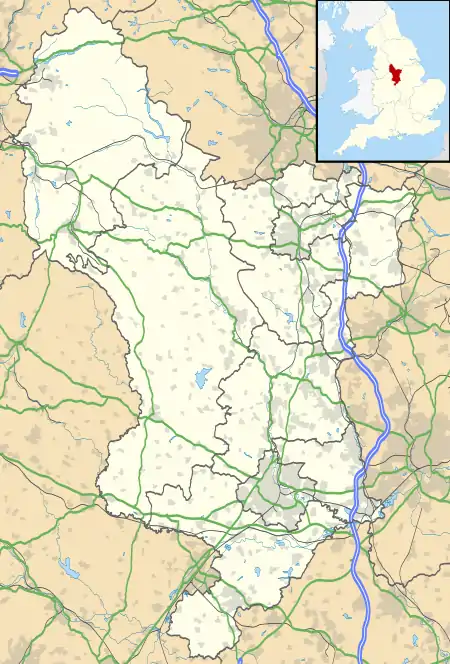Heanor Town Hall
Heanor Town Hall is a municipal building in the Market Street, Heanor, Derbyshire, England. The town hall, which is the meeting place of Heanor and Loscoe Town Council, is a grade II listed building.[1]
| Heanor Town Hall | |
|---|---|
.jpg.webp) Heanor Town Hall | |
| Location | Market Street, Heanor |
| Coordinates | 53.0140°N 1.3537°W |
| Built | 1867 |
| Architectural style(s) | Italianate style |
Listed Building – Grade II | |
| Official name | Registry Office |
| Designated | 25 May 1988 |
| Reference no. | 1158590 |
 Shown in Derbyshire | |
History
The building was initially commissioned as "public offices" for the local board of health, which had been formed in 1863.[2] It was designed in the Italianate style, was built in red brick with stone dressings and was completed in 1867.[3] The design involved a symmetrical main frontage with five bays facing onto Market Street; the central bay, which projected forward at ground level but with the projection tapering back higher up, featured a round headed doorway with a fanlight and a stone surround on the ground floor; there were five round headed windows with keystones forming an arcade on the first floor and a series of modillions supporting a cornice above. Internally, the principal room was the council chamber.[4] In the 19th century an adjacent building to the north west formed a lock-up and police station.[5] The public offices became the meeting place of Heanor Urban District Council when it was formed in 1894.[6][7]
In 1908 Fred Buxton of Langley Mill hired the building to show moving pictures and a banner was hoisted outside the building advertising its new role as "Buxton's Picture Palace".[5][8] Then, on 2 March 1910, during the Ilkeston by-election, the suffragette, Emmeline Pankhurst, booked the building and gave a speech in support of the Liberal Party candidate and future Secretary of State for War, J. E. B. Seely:[9] the meeting was well supported with hundreds of people in attendance.[10]
The building continued to serve as a meeting place for Heanor Urban District Council for much of the 20th century but ceased to be local seat of government when the enlarged Amber Valley Borough Council was formed in 1974.[11] It was subsequently used as a registry office and, after its condition deteriorated, it was saved from demolition in the early 1990s.[12] After an extensive programme of refurbishment works which was completed in June 1995, the building then became the meeting place of Heanor and Loscoe Town Council.[13] A millennium banner depicting the stained glass windows of the parish church, local individuals, the town fair and the market place, was embroidered by members of the local community and presented to the mayor, Harry Soar, on 11 November 1998; it was subsequently placed on display in the council chamber in the building.[4]
References
- Historic England. "Registry Office (1158590)". National Heritage List for England. Retrieved 19 January 2021.
- "Heanor Urban District Council and predecessors". Derbyshire County Council. Retrieved 19 January 2021.
- "Prime Number Challenge: Two Weeks In". BBC. 19 July 2011. Retrieved 19 January 2021.
- "About Heanor and Loscoe". Heanor and Loscoe Town Council. Retrieved 19 January 2021.
- "Heanor Market Place". Heanor and District Local History Society. Retrieved 19 January 2021.
- Great Britain Historical GIS / University of Portsmouth, Heanor Urban District Urban District. Retrieved 19 January 2021.
- Youngs Jr, F. A. (1991). Guide to the Local Administrative Units of England, Vol II: Northern England. London.
- "Big Names". Mapperley Village History. Retrieved 19 January 2021.
- "Suffragettes". Heanor and District Local History Society. Retrieved 19 January 2021.
- "Town hall to commemorate historic visit by suffragette". Ripley and Heanor News. 15 July 2017. Retrieved 19 January 2021.
- Local Government Act 1972. 1972 c.70. The Stationery Office Ltd. 1997. ISBN 0-10-547072-4.
- "Heanor". Derbyshire Peak District. Retrieved 19 January 2021.
- "Calendar of Council Meetings" (PDF). Heanor and Loscoe Town Council. Retrieved 19 January 2021.